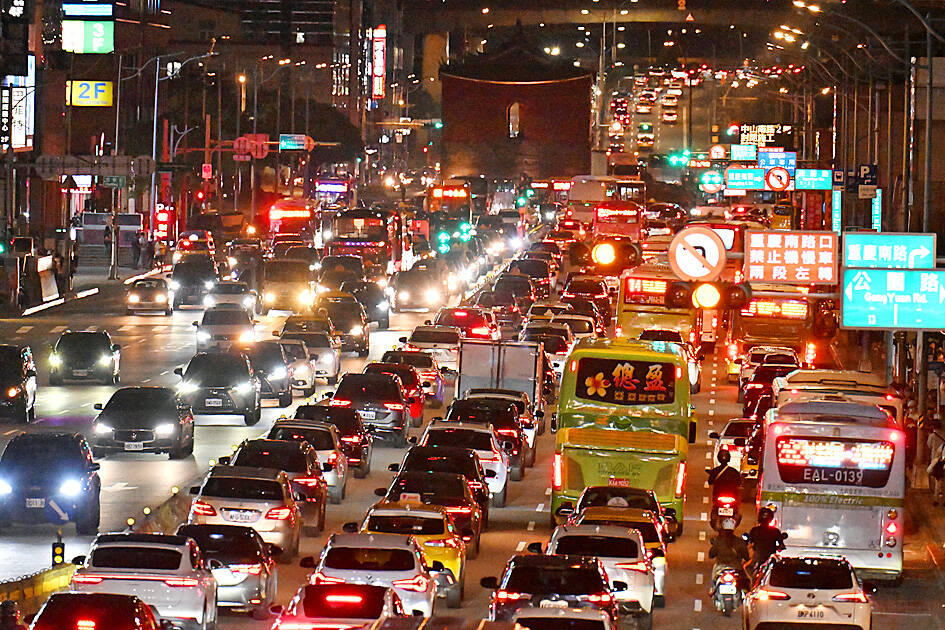The number of traffic incidents involving drivers aged 65 or older have been increasing every year, despite a policy that took effect in 2017 requiring drivers aged 75 or older to pass a physical and cognitive test every three years, data from the Ministry of Transportation and Communications showed.
The number of car and motorcycle incidents involving people aged 65 or older has increased 78 and 93 percent respectively over the past seven years, while the number of people in that age category caught driving without a license has also increased, the data showed.
In 2017, 1,050 traffic incidents involving people aged 65 or older driving heavy motorcycles were reported, while 643 incidents involving people aged 65 or older driving small passenger vehicles were recorded, the ministry’s road safety information inquiry Web site showed.

Photo: Tien Yu-hua, Taipei Times
Those figures increased to 2,029 and 1,146 respectively last year.
For the first three months of this year, those figures were 501 and 306 respectively, and if that trend continues, this year’s totals are likely to be a record high.
The policy implemented in 2017 requires people aged 75 or older to renew their driver’s license every three years to pass a health examination, a cognitive test and submit a certificate proving that they do not have moderate-to-severe dementia. If they refuse to return or renew their license, it would be revoked.
In the first year the policy went into effect, just more than 80 percent of drivers aged 75 or older who were required to renew their licenses did so, while as of the end of last month, 90.9 percent had renewed them, Highway Bureau data showed.
As the data refer to traffic incidents involving drivers aged 65 or older, while the license renewal policy is for drivers aged 75 or older, there is no clear correlation between the incident numbers and the policy, bureau official Wei Wu-sheng (魏武盛) said yesterday.
The bureau is planning to commission a study of the issue, he said.
Since the license renewal policy was implemented, no official academic research has been conducted on its effects, said Lee Chung-yi (李中一), a professor in National Cheng Kung University’s Department of Public Health.
The ministry should investigate the main causes of traffic incidents involving older drivers, to understand whether they were caused by cognitive or physical issues, Lee said.
It should “also pay attention to older drivers who choose to drive without a renewed license and how to prevent them from doing so,” he said.
Motor vehicles offices provide special care for drivers aged 70 or older, such as sending helpful information to those who have been fined for a traffic offense, Wei said.
The bureau is discussing whether that policy should be extended to drivers aged 65 or older, he said.
Asked if the license renewal policy might also be extended to cover a wider age group, he said that as it would affect a large number of drivers, the bureau has not discussed the matter.

MORE VISITORS: The Tourism Administration said that it is seeing positive prospects in its efforts to expand the tourism market in North America and Europe Taiwan has been ranked as the cheapest place in the world to travel to this year, based on a list recommended by NerdWallet. The San Francisco-based personal finance company said that Taiwan topped the list of 16 nations it chose for budget travelers because US tourists do not need visas and travelers can easily have a good meal for less than US$10. A bus ride in Taipei costs just under US$0.50, while subway rides start at US$0.60, the firm said, adding that public transportation in Taiwan is easy to navigate. The firm also called Taiwan a “food lover’s paradise,” citing inexpensive breakfast stalls

US PUBLICATION: The results indicated a change in attitude after a 2023 survey showed 55 percent supported full-scale war to achieve unification, the report said More than half of Chinese were against the use of force to unify with Taiwan under any circumstances, a survey conducted by the Atlanta, Georgia-based Carter Center and Emory University found. The survey results, which were released on Wednesday in a report titled “Sovereignty, Security, & US-China Relations: Chinese Public Opinion,” showed that 55.1 percent of respondents agreed or somewhat agreed that “the Taiwan problem should not be resolved using force under any circumstances,” while 24.5 percent “strongly” or “somewhat” disagreed with the statement. The results indicated a change in attitude after a survey published in “Assessing Public Support for (Non)Peaceful Unification

PLUGGING HOLES: The amendments would bring the legislation in line with systems found in other countries such as Japan and the US, Legislator Chen Kuan-ting said Democratic Progressive Party (DPP) Legislator Chen Kuan-ting (陳冠廷) has proposed amending national security legislation amid a spate of espionage cases. Potential gaps in security vetting procedures for personnel with access to sensitive information prompted him to propose the amendments, which would introduce changes to Article 14 of the Classified National Security Information Protection Act (國家機密保護法), Chen said yesterday. The proposal, which aims to enhance interagency vetting procedures and reduce the risk of classified information leaks, would establish a comprehensive security clearance system in Taiwan, he said. The amendment would require character and loyalty checks for civil servants and intelligence personnel prior to

The China Coast Guard has seized control of a disputed reef near a major Philippine military outpost in the South China Sea, Beijing’s state media said, adding to longstanding territorial tensions with Manila. Beijing claims sovereignty over almost all of the South China Sea and has waved away competing assertions from other countries as well as an international ruling that its position has no legal basis. China and the Philippines have engaged in months of confrontations in the contested waters, and Manila is taking part in sweeping joint military drills with the US which Beijing has slammed as destabilizing. The Chinese coast guard